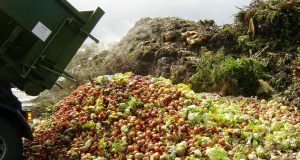WASHINGTON — U.S. Senator Richard Blumenthal (D-CT) and U.S Congresswoman Chellie Pingree (D-ME) have introduced H.R. 3444, the Food Recovery Act, comprehensive bicameral legislation to reduce food waste in stores and restaurants, schools and institutions, on farms, and in American homes.
Every year in the United States, 40 percent of food produced domestically goes uneaten – meanwhile, domestic food production accounts for 50 percent of United States land use, 80 percent of fresh water consumption and 10 percent of the total energy budget. Food waste in landfills further harms the environment by contributing dramatically to the production of methane and other harmful gases. The Food Recovery Act takes a top to bottom approach to plugging the stream of food waste across all industries and demographics.
“This bill would address inefficiencies that lead to waste across all aspects of the food supply chain – curbing the 62 million tons of food thrown out each year in the United States,” said Blumenthal. “Simplifying food date labeling and diverting healthy, wholesome food from landfills won’t just benefit the environment – it will help alleviate food insecurity and save consumers and businesses money. I urge my colleagues to join us and tackle the challenge of food waste with the multifaceted response it demands.”
“Food waste in America is a growing problem, but it is also an opportunity,” said Pingree. “We can save money for consumers, create economic opportunity, and feed those in need while keeping perfectly good food out of landfills. I’m proud to introduce the Food Recovery Act with Senator Blumenthal to support and build on efforts already going on in our communities to ensure that more of our food is put to use rather than going to waste.”
H.R. 3444, the Food Recovery Act will:
- Reduce food waste at the consumer level through the inclusion of the Food Date Labeling Act to standardize confusing food date labels;
- Reduce food wasted in schools by encouraging cafeteria’s to purchase lower-price “ugly” fruits and vegetables, and by extending grant programs that educate students about food waste and recovery;
- Reduce wasted food throughout the federal government through the establishment of a Food Recovery Liaison at USDA to coordinate federal efforts, and by requiring companies that contract with the federal government to donate surplus food to organizations such as food banks and soup kitchens;
- Reduce wasted food going to landfills by encouraging composting as a conservation practice eligible for support under USDA’s conservation programs; and
- Reduce wasted food through research by directing the USDA to develop new technologies to increase the shelf life of fresh food, and by requiring the USDA to establish a standard for how to estimate the amount of wasted food at the farm level.
Senators Ron Wyden (D-OR), Brian Schatz, (D-HI), Jeff Merkley (D-OR), and Cory Booker (D-NJ) are original cosponsors of the Food Recovery Act.
The legislation is supported by the Harvard Food Law and Policy Clinic, the American Biogas Council, Recology, Hungry Harvest, National Farmers Union, National Consumers League, Food Policy Action, the National Resources Defense Council, and FoodCorps.



